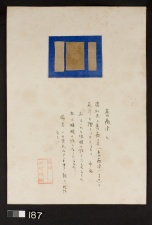Difference between revisions of "Koi beniiro no bara - center (187 C)"
Jump to navigation
Jump to search
(username removed) |
(username removed) |
||
| Line 5: | Line 5: | ||
| 187 | | 187 | ||
|- | |- | ||
| − | ! scope="row"| | + | ! scope="row"|Uemura number / title |
| − | | | + | | ; "Haze-some 25" |
|- | |- | ||
! scope="row"|Folder location | ! scope="row"|Folder location | ||
| Line 44: | Line 44: | ||
| - | | - | ||
|- | |- | ||
| − | ! scope="row"| | + | ! scope="row"|Uemura's notes |
| The flower petals were rubbed onto the fabrics. Subsequently, the left and right samples were treated with hydrochloric acid and acetic acid respectively. The color variations created by the auxiliary agents are typical of anthocyan group. | | The flower petals were rubbed onto the fabrics. Subsequently, the left and right samples were treated with hydrochloric acid and acetic acid respectively. The color variations created by the auxiliary agents are typical of anthocyan group. | ||
|- | |- | ||
| − | ! scope="row"| | + | ! scope="row"|Uemura's date |
| Kyoto | | Kyoto | ||
|} | |} | ||
| − | [[Category: | + | [[Category:Uemura dye archive]] |
Latest revision as of 07:18, 24 July 2013
| Museum number | 187 |
|---|---|
| Uemura number / title | ; "Haze-some 25" |
| Folder location | 3rd shelf |
| Sample location | center (187 C) |
| Fiber type | cotton |
| Color | brown |
| Dyestuff (Japanese common name) | 濃紅色の薔薇 : Koi beniiro no bara |
| Dye (English common name) | Tea rose /dark red rose |
| Dyestuff (botanical name) | Rosa X centifolia L. (?) |
| Plant part | flower /fresh (?) |
| Dyestuff extraction | rubbed onto the fabric |
| Auxiliary agent in dye bath | - |
| Mordant | - |
| Other auxiliary agent | - |
| Uemura's notes | The flower petals were rubbed onto the fabrics. Subsequently, the left and right samples were treated with hydrochloric acid and acetic acid respectively. The color variations created by the auxiliary agents are typical of anthocyan group. |
| Uemura's date | Kyoto |
